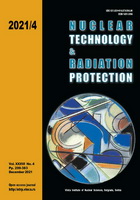
EFFECTS OF DIFFERENT NANO SIZE AND BULK WO3 ENRICHED BY HDPE COMPOSITES ON ATTENUATION OF THE X-RAY NARROW SPECTRUM

Vol.
XXXVI, No. 4, Pp. 299-383
December 2021
UDC 621.039+614.876:504.06
ISSN 1451-3994
Pages: 315-328
Authors: Amro Obeid, Hanna EL Balaa, Omar EL Samad, Zainab Alsayed, Ramadan Awad, and Mohamed S. BadawiAbstract
The X-rays of the narrow-spectrum N-series ranging from 40 kV to 150 kV were used to determine the radiation attenuation ability of a new category of a polymer composite fabricated for shielding purposes. High density polyethylene was synthesized through a compression molding technique, and incorporated with various filler amounts (10, 15, 25, and 35 wt.%) of bulk micro-sized WO3 (Sample A), two WO3 nanoparticles 45 nm (Sample B), and 24 nm (Sample C). The WO3 filler was identified and characterized using X-ray diffraction and a transmission electron microscope. The mass distribution of the chemical elements of the synthesized composites was determined by energy dispersive X-ray analysis. The obtained results of the different attenuation parameters revealed that the particle size and weight fraction of WO3 particles have an outstanding effect on the X-ray shielding ability of this composite. The experimental measurements of the mass attenuation coefficients were compared to the theoretical values tabulated in the NIST databases XCOM and FFAST. The mass attenuation coefficient was increased with the increment of WO3 wt.% as well as with the decrease of the WO3 particle size. This improvement in the attenuation parameters of the NP(C) composite suggests their promising applications in radiation protection at the diagnostic level.
Key words: high density polyethylene, WO3 nanoparticle, mass attenuation coefficient, radiation protection
FULL PAPER IN PDF FORMAT (2.17 MB)